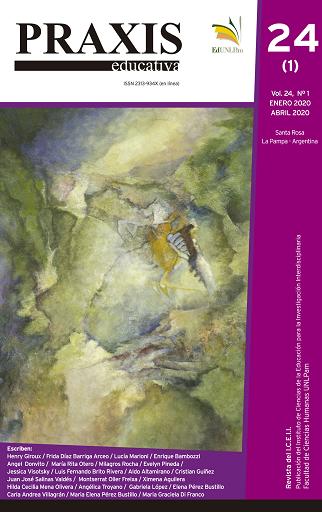Theories of education in democratic citizenship practices in educational institutions: democratic functions and actors from the perspective of managers and teachers
DOI:
https://doi.org/10.19137/https://dx.doi.org/10.19137/praxiseducativa-2020-240112Keywords:
educational theory, democracy, educational institutions, participation.Abstract
This article accounts for an exploratory-descriptive research, whose objective is the identification and analysis of different theories of education present in the practices of democratic citizenship at educational institutions of the Province of Córdoba. It is based on the analysis of the representations students, teachers, and administrators make of their practices. It is grounded on the hypothesis that the theories of education configuring the practices of democratic citizenship may be explored and identified, and that these are associated -in part- with the ways of conceiving
knowledge, learning, subjects, and the relationship between the educational institution and society. Thus, there is a classification of democratic practices, prepared as a temporary result of the analytical matrix used for the interpretation of the meanings explored in students, teachers, and administrators.
Downloads
References
Alonso, L. (1994): Sujeto y discurso: “El lugar de la entrevista abierta en las prácticas de la Sociología Cualitativa”, Madrid. Ed. Síntesis.
Braslavsky, B. (2003). ¿Qué se entiende por alfabetización? Lectura y vida, 24(2), 2-17.
Briones, G. (20029. Epistemología de las ciencias sociales, INSTITUTO COLOMBIANO PARA EL FOMENTO DE LA EDUCACIÓN SUPERIOR, ICFES DIRECCIÓN GENERAL. Bogotá, Colombia, pág. 36
Cohen, L. (1990). Métodos de investigación educativa. Madrid: Muralla.
Del Castillo, J. J. (2005). Redefinición del analfabetismo: el analfabetismo funcional. Revista de Educación, (338), 273-294.Recuperado de: http://www.toscana.edu.co/cms/images_cms/2c0afe_Pb3jq1Oz.pdf.
Espinoza Díaz, O., Loyola Campos, J., Castillo Guajardo, D. y González, L. (2014).La Educación de Adultos en Chile: Experiencias y Expectativas de los Estudiantes de la Modalidad Regular. Última década, 22(40), 159-181.
Ferrero, E. (1989). Los Hijos del Analfabetismo, Propuesta para la alfabetización de América Latina. México: María Orcos.
Galindo Cáceres, J. (1998): la historia oral y de vida: del recurso técnico a la experiencia de investigación. México D. F., Prentice Hall, Pearson Educación y Addison Wesley.
Gibbs, G. (2012): El análisis de los datos cualitativos en investigación cualitativa. Morata
.
Husserl, E. (1996).Diccionario de Filosofía. México: Editorial Diana.
Ministerio de Educación. (2009). Manual del Monitor Contigo Aprendo. Santiago: MINEDUC.
Ministerio de Educación. (2008). Marco para la Buena Enseñanza. Santiago: CEPEIP.
Mural. (2016). Educación de Adultos. Recuperado de: http://mural.uv.es/amarjau/conceptos.html
Parcerisa, A. (2004). Didáctica en la educación social. Barcelona: Graó.
Pérez, J (2001) “Programación Neurolingüística y sus estilos de aprendizaje”,
disponible en http://www.aldeaeducativa.com /aldea/tareas2.asp?which=1683
Pérez, L. (2004). ¿Quién dijo que no se puede? Chile: UNICEF.
Pozo, J.I. (2006).Teorías cognitivas del aprendizaje. Villa María: Editorial Universitaria Villa María.
Real Academia Española. (2016). Diccionario de la lengua española. Recuperado de:
http://dle.rae.es/?id=1jW6YGF.
Strauss y Corbin (2002) Bases de investigación cualitativa; técnicas y procedimientos para desarrollar teoría fundamentada. Editorial universidad de Antioquia. Primera edición en español.
UNESCO. (2009). Vivir y aprender para un futuro viable: el poder del aprendizaje de adultos. Belém: UNESCO.
UNESCO. (2016). Alfabetización | Educación | Organización de las Naciones Unidas para la Educación, la Ciencia y la Cultura. [Online] at: https://es.unesco.org/themes/alfabetizacion
Vygotski, L. S. (1984). Aprendizaje y desarrollo intelectual en la edad escolar. Infancia y aprendizaje, 7(27-28), 105-116.ISBN: 84-7133-628-6.
Vygotsky, L. (2008).Teoría del aprendizaje. Santiago de Chile: Ministerio de Educación.
Yin, R. (1989) Investigación sobre estudios de casos: Diseño y método, Sage publicaciones. https://panel.inkuba.com/sites/2/archivos/YIN%20ROBERT%20.pdf
Downloads
Published
Issue
Section
License
Copyright Notice
Editorial Committee Educational Praxis Magazine:
I hereby declare that I am the author of the article titled (article name), that it is original and my own and that it was not previously published in any other format or medium. I declare to know that the magazine will not charge me any type of fee under any circumstances, nor will I receive any type of monetary compensation If it were accepted for publication in Educational Praxis, I authorize the aforementioned magazine to publish it digitally and to advertise it on its social networks.
If the work is published, I adhere to the Creative Commons license called "Attribution - Non-Commercial Share Alike CC BY-NC-SA", through which it is allowed to copy, reproduce, distribute, publicly communicate the work and generate derivative works, as long as when the original author is cited and acknowledged. This license has been used since September 2018. In 2016 CC BY NC ND 4.0 was adhered to; and in the years 2017 and 2018 (January-August) CC BY NC 4.0.
This CC BY-NC-SA Share Alike license does not, however, permit commercial use of the work. As an author, the journal may establish additional agreements for the non-exclusive distribution of the version of the work published in the journal, it allows me to self-archive the published articles, in their post-print version, in institutional, thematic repositories, personal web pages or any other relevant use. with the recognition of having been first published in this journal.
Educational Praxis adheres to DORA (Declaration on Research Assessment) signed in San Francisco, California, on December 16, 2012, and to the Declaration of Mexico (Joint Declaration LATINDEX - REDALYC - CLACSO - IBICT).















_(1)2.png)


3.png)











_(2).png)






2.jpg)









